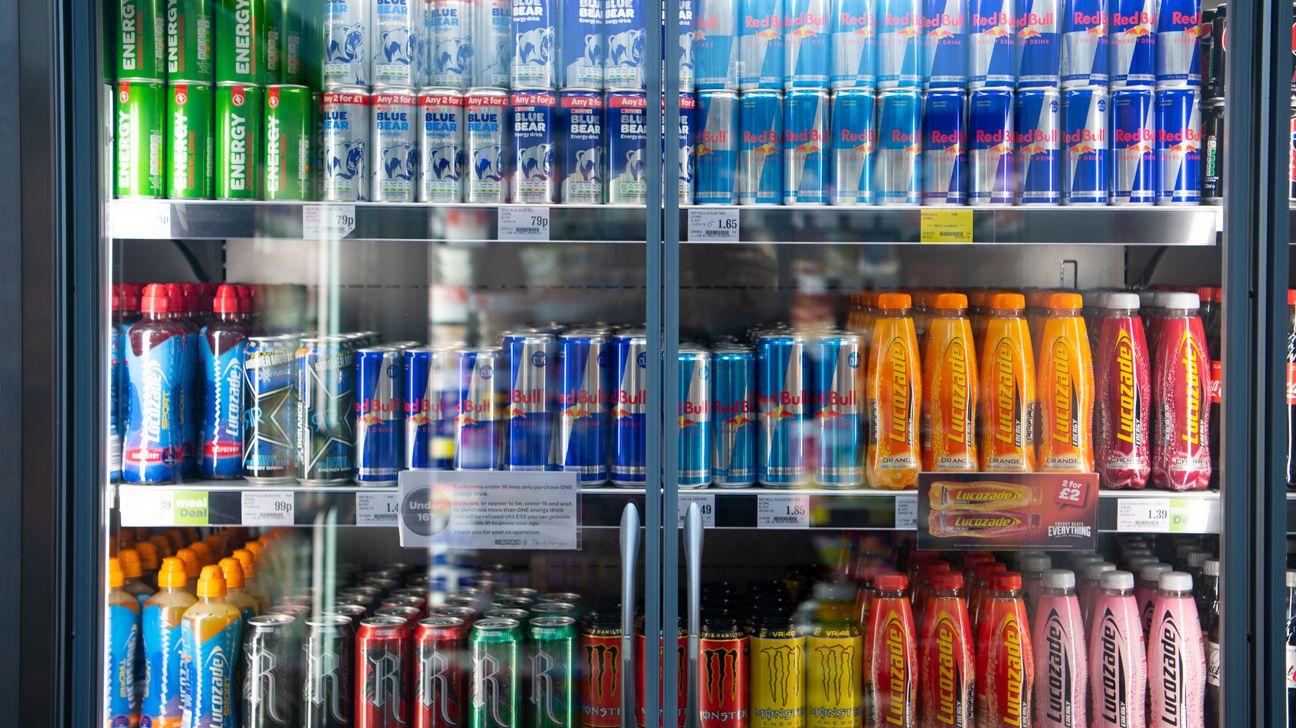
- A new research review adds to a growing body of evidence demonstrating the harmful health effects of energy drink consumption, particularly among people 21 and under.
- Young people who consume energy drinks may experience sleep disturbances and have an increased risk of ADHD, anxiety, and mood changes, and in severe cases, heart complications.
- Health experts recommend avoiding energy drinks due to the negative side effects.
- Healthier beverage options include water, and if kids are drinking caffeine, it should be in low amounts.
Energy drinks have exploded in popularity in recent years, particularly among teens. Over
However, there are many potentially dangerous side effects of excessive energy drink use.
In a new systematic review, researchers examined 57 studies about the effects of energy drinks on children and young people up to the age of 21. They looked at data from January 2016–July 2022.
The results, published on January 15, show that male teens consume more energy drinks than females. Researchers also discovered a link between energy drink consumption and harmful behaviors like smoking, alcohol and drug use.
Additional effects of energy drink consumption in both male and female teens included:
- short sleep duration
- poor sleep quality
- low academic performance
- greater risk of suicide
- psychological distress
- ADHD symptoms
- depression
- panic and anxiety disorders
Energy drinks are loaded with caffeine in amounts that far exceed daily recommended doses for adults. They are often marketed toward young people.
In July 2023, the Food and Drug Administration (FDA) reviewed concerns about Prime Energy, a popular energy drink among children and teens that contains as much caffeine as six cans of Coke. No restrictions or bans on Prime Energy have yet been made.
Energy drink consumption can affect the mental and physical health of young people, particularly when consumed in excess.
Some experts say teens may turn to energy drinks as a coping mechanism.
“Energy drinks symbolize — in this case in a young person, the act of searching for something outside of oneself to fill a perceived void,” said Anna Scott, a licensed therapist specializing in teen mental health. “The long-term consequence translates as codependency.”
Some teens may consume energy drinks for performance enhancement on tests while others may engage out of social acceptance, Scott explained.
Erika Chiappini, PhD, a child and adolescent psychologist with the Johns Hopkins Children’s Center, said that energy drinks lead to sleep disruption, which can impact mood and cognitive functioning.
“Because energy drinks have high amounts of caffeine, they can negatively impact sleep,” she said. “Youth drinking energy drinks may have greater difficulty falling asleep and experience poorer sleep quality overall, especially when taken in the afternoon [or] evening.”
“Poorer sleep quality and getting an inadequate amount of sleep is associated with poorer emotion regulation ability and difficulty with attention, anxiety, and mood symptoms, which can lead to lower academic performance and difficulty in friendships and at home,” Chiappini explained.
Many young people turn to energy drinks is to
During her tenure as a high school counselor at a public school, Scott noticed an increase in energy drink consumption among students, regardless of their background.
Energy drinks were viewed as a tool to give kids that extra push, Scott explained.
“While the highest achievers used energy drinks to supplement their exhaustion due to overworking their brains in order to be good enough to be recognized by parents, teachers, or potential post-secondary programs — the usage of products to amplify neurological performance was witnessed across the board,” Scott said.
“From ‘the thing to have’ in the gamer club after school, to the ‘thing to survive’ for the kid who actually couldn’t sleep the night before due to emotional distress or familial issues, or the ‘thing required’ to prove academic excellence and stamina,” she added.
Scott noted that one way to break the energy drink habit could be by teaching children how to manage their emotions and gain greater self-awareness at a younger age.
The
- dehydration (not enough water in your body)
- heart complications (such as irregular heartbeat and heart failure)
- anxiety (feeling nervous and jittery)
- insomnia (unable to sleep)
“Signs that a child [or] teen is negatively affected by energy drinks would be a decrease in the amount of sleep they receive overnight and changes in their baseline functioning when it comes to academic performance, relationships with others, and their ability to cope with their emotions,” Chiappini said.
If your child is using is relying on caffeine to get them through the day, it can be helpful to encourage healthy sleep hygiene practices, such as limiting electronic exposure (phones, TVs, tablets, laptops, etc.) an hour before bed, Chiappini noted.
“Elementary and middle school-aged youth should get around 10 hours of sleep each night, and high schoolers should aim for about 9 hours,” she said.
It also helps to maintain similar wake-up times and bedtimes. Aim to adjust for no more than 2 hours of extra sleep on weekends.
“Though other beverages would be preferred for youth to drink throughout the day, if youth do drink caffeine, aim for drinks with lower amounts and stop drinking them after about lunch,” Chiappini said.
Regardless, people of all ages need to stay hydrated with the right liquids, especially water.
“If you’re going to drink something to nourish yourself and ‘wake up,’ you might as well drink water,” said Scott. “To kick it up a notch, you can add some clean electrolytes with magnesium.”
A new research review shows the negative health consequences of energy drink consumption among the children and teens.
Energy drinks can disrupt poor sleep quality, negatively impact mood, and lead to mental health issues like anxiety and depression.
In severe cases, excess energy drink consumption could also cause heart complications.
Health experts recommend avoiding energy drinks entirely. They have no nutritional value.


